by Jenny Rose | Mar 30, 2024 | A Flourishing Woman, Self-Love
When I wrote about internal locked rooms earlier in the month, I had no idea how much there would be to unpack. In subsequent discussions about locked rooms and unconditional love (for a connect-the-dots map go here) a friend tells me she believes trusting herself is the biggest barrier for her in unconditionally loving herself. Me being me, I asked her how we define trust. In asking her I asked myself.

Photo by Jonathan Simcoe on Unsplash
Here we go again.
Trust is defined by Online Oxford Dictionary as “firm belief in the reliability, truth, ability, or strength of someone or something.”
Trust is a tricky subject for me and I’ve so far avoided taking it head on, but this feels like the right time. Part of my hesitation to talk about it is my own identity as a person who doesn’t trust easily.
I feel that piece of identity as a shameful aspect of my character. As I write this, I have a vivid childhood memory of being in the back of a dim car in a blinding snowstorm feeling scared. An adult in the car was also fearful, as were the family dogs. The driver asked me, “What’s the matter, don’t you trust me?”
The answer clamored inside the car, “NO!” For a moment it seemed to me we’d all shouted it, though nobody said a word and I huddled, frozen with fear and not daring to speak, in my corner.
It’s bad not to trust; disloyal, unloving, unnatural. But I learned very young trusting those around me was dangerous. All my life I’ve been torn between my shame about not trusting and a determination to survive and learn to self-defend … which sometimes (often?) means not trusting.
I don’t see trust as a black-and-white belief. I might trust someone completely with money and business affairs, but not at all as a confidant. I might trust someone as a parent but not as a dog walker. I might trust someone’s essential goodness but not their reliability in following through on plans.
This question of trusting ourselves, though, is slightly different. What does it mean, exactly, to not trust ourselves? What do I mean when I say it to myself?
Trust is defined as a belief, and beliefs can and do change. Belief is a choice. My belief that I’m untrustworthy is not something I was born with, but something I internalized from my family. I’m untrustworthy because I’m dramatic, I struggle with math story problems, I have needs and feelings, I’m intuitive, I’m sensitive, I have boundaries, I challenge authority and rules, and I tell the truth, among many other reasons.
Internalized voices are a bitch, because we don’t realize or remember they came from someone outside us.
And people outside us lie. People outside us can never fully see what’s inside us. People have agendas, their own wounds and trauma, and navigate around their own internalized bullshit.

Photo by Cristian Newman on Unsplash
People outside us are not necessarily reliable sources about our worth and value as a human being.
If trust is a “firm belief in the reliability, truth, ability, or strength of someone or something,” we have specifics we can explore.
Reliability: I know myself to be reliable. I have many flaws, but my integrity is strong and I keep my word to myself.
Truth: A thorny aspect of trust. I wrote two paragraphs here about the ways in which others perceive my truthfulness. On edit, I realized none of that has to do with my truthfulness with myself, which will always be invisible to the outside world. Do I trust my truthfulness with myself? Yes. Absolutely.
Ability: This is my weakest area of self-trust. In some ways. At some times. I wrestle every day with imposter syndrome. On the other hand, I absolutely trust my ability to write, to teach, to swim, to dance, and to do many other things. Oddly, though I trust my ability in most cases, I don’t want others to trust my ability because I have a huge fear of disappointing people. This, too, is an old wound, first opened when I received constant messaging about how disappointing and inadequate I was as a child. Because of that, I don’t want people to rely on me for fear I’ll let them down, not from my perspective, but from theirs.
I told you trust was tricky for me.
Strength: Which brings me to strength. This, for me, is a no-brainer. I have absolute belief in my own strength. God knows I wouldn’t be sitting here at the keyboard typing if I hadn’t been strong all my life.
Given this mostly positive review of the components of this definition of trust, what’s the problem? Why have I so consistently mistrusted myself during my lifetime?
I can easily come up with two reasons. There may be more lurking in the background, but these two are in front: One is trust in my physical body, and the other is perfectionism.
Perfectionism is one of the first things I wrote about on this blog. It’s another piece from my childhood I’ve struggled with it all my life, and I’m certainly not the only one. I’m conscious of it now, which is helpful, but it affects every day of my life and if I’m not mindful it rules me. Publishing this blog was one of my first real efforts at resistance. It took more than a year of weekly publishing to stop feeling panic as I pushed the “publish” button after a reasonable amount of writing and editing.
Even as perfectionism drives me, I’m aware enough to know I can’t define it beyond pleasing people. Which is impossible, and I know that. Yet the internal pressure to be perfect seems to be inescapable.
I’ve also written extensively about expectations. As a child, I was expected to be perfect according to conflicting expectations from three adults on whom I was dependent. Needless to say I failed to please any of them, which meant I lived in a constant state of shame and fear of abandonment. A perfect setup for internalized self-loathing. The road from self-loathing to considering unconditional self-love has been an amazing journey.
I was aware, as I explored ability, reliability, truth, and strength above, of a little voice in my head saying, “Yes, but—,” a precursor to the time I was late, or forgot an appointment, or the occasions I did deliberately lie, or the times I felt weak, or when my ability did not live up to my own unconscious standards of perfectionism.
As I became aware of this, I realized I will never trust myself if I aspire to be perfect in these four categories. I have never been perfect, I am not perfect, I never will be perfect, and I’m not much interested at this point in my life in attaining perfection in any way.
So fuck off, perfectionism. I’m not your bitch anymore. AND you will not stop me from loving myself, unconditionally or otherwise. Unconditional love is not built on some ridiculous set of expectations.

Photo by Emma Backer on Unsplash
Which brings me to an interesting insight on my relationship with my body. Let’s not do the body-as-a-political-signal thing, OK? I’m sick of it. We all live in a body. We have baggage about how our bodies look and function. We’re pressured, every day, to try to buy a “better” body, especially children. In today’s world, many of us feel we “should” be different, no matter what we look like. Currently, we’re obsessed with appearance and virtue signaling rather than health and function.
I don’t hate my body. However, due to autoimmune issues and years of chronic pain, I haven’t trusted it. Until the last ten years or so, since I’ve gone carnivore, my physical state was extremely limiting; I was unable to engage fully in activities I loved, get regular exercise, or even reliably manage the activities of daily living without severe pain.
Now I have my inflammation under control, my chronic pain is gone, and I’m able to joyfully live the kind of active lifestyle I’ve always wanted: gardening, walking, swimming, water aerobics, free weights, stretching, a little yoga, a little Pilates, a little time in the gym. I’m healthier and more active than I’ve ever been, but I am aging, and as I age, my body is changing. (Big surprise, I know!) I noticed, in my post about unconditional self-love, some of the things I wrote about unconditionally loving were physical things. In this culture, nobody tells us to love our varicose veins, or our age-spotted hands, or our lined neck. Instead, we’re encouraged to buy something and “fix” all those problems, or at least hide them.
That’s not unconditional love. (I also deny it’s “body positivity,” but I don’t want to dive into that rabbit hole!)
I know if I push myself too hard my body will hurt. I know if I allow my anxiety to spin out of control I won’t sleep. I know if I eat a whole pizza I will a) have inflammation and pain from the carbs and b) have severe constipation (cheese). I know if I garden for too many hours at a time I’ll be too stiff the next morning to get dressed without sitting down. I know if I spend too many hours in the pool I’ll develop eczema on my elbows and hips.

Photo by Cristian Newman on Unsplash
I ask myself, does all this mean I don’t trust my body? Because it actually sounds like I do trust it to react to my choices in various predictable ways. Is what I’m really saying I don’t trust my body to be a 20-year-old perfect body?
Well …. Yeah. I guess that is what I’m saying. Pretty silly.
My friend doesn’t feel she can unconditionally love herself without trusting herself. She’ll navigate her own path through all this. My own conclusion is I can trust myself. Perhaps I should consciously start doing so. (What an idea!) For me, lack of self-trust is not an obstacle to unconditional love, but it certainly makes a nice contribution to it.
Questions:
- Do you see trust as essential to unconditional love?
- Do you agree with this definition of trust? If not, how would you define it? Can you find a better definition?
- What aspect of trust in this definition do you struggle with the most?
Leave a comment below!
To read my fiction, serially published free every week, go here: 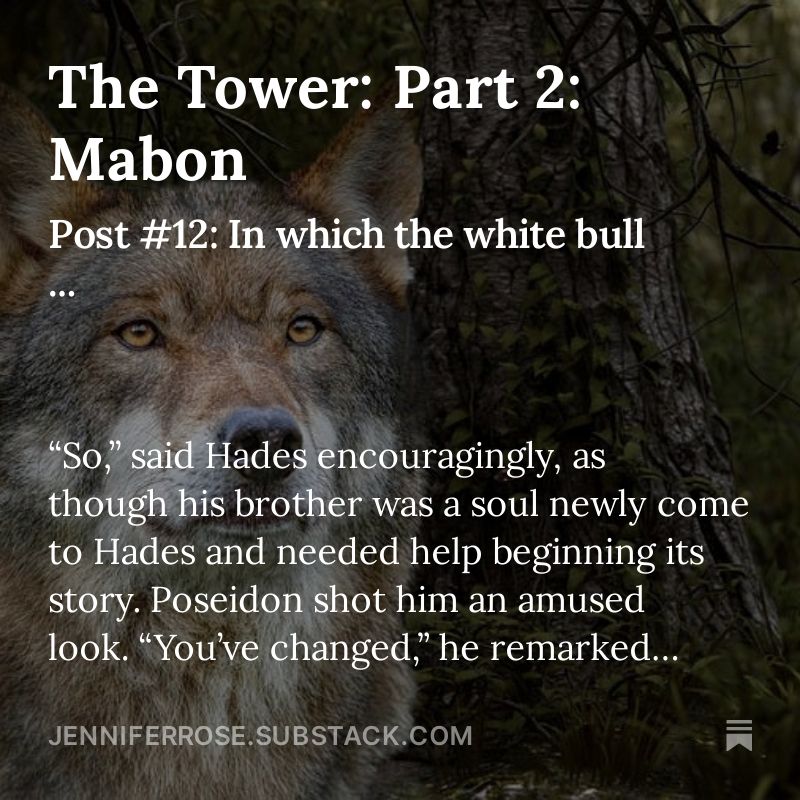
by Jenny Rose | Feb 25, 2023 | Connection & Community, Emotional Intelligence, Shadows
I found a brief offering in my Inbox from Seth Godin recently about bitterness being a wall we can lean against. The image caught my imagination. Since then, I’ve been thinking about walls … boundaries … supports … prisons … and the desperate, destructive choices we make to survive.

By Marc Pell on Unsplash
Walls. On the one hand, I like walls. I invariably position myself with my back against a wall when I’m in crowds or unfamiliar places. Nothing malignant can sneak up on me from behind. All my hypervigilance can go into watching my sides and front. I feel safe(er).
A corner is even better. Now two sides are covered.
A third wall, as in a blind alley or cul-de-sac, begins to feel more like a trap than a place of protection. What if I want to run away? I’m blocked on three sides.
A fourth wall? Now I’m in prison.
The thing about walls is they may keep danger out, but they keep everything else out, too. The good stuff. Love. Sunshine. Wandering children and butterflies. Inviting paths and trails. Possibility. Exploration. Views. Perspective. Wonderful surprises.
Walls, like everything else in life, can be taken too far. Built too wide and thick. Impenetrable. Too high to climb.
Shelter or dungeon?
What about metaphorical walls? What do we lean against because it’s familiar and we believe it keeps us safe from failure, from disappointment, from heartbreak?
Bitterness, certainly. We’ve risked. We’ve been vulnerable. It ended badly. We feel angry, disappointed, resentful. Never again, we tell ourselves. Things don’t work out for us. The world is against us. People suck. Life sucks. It’s our story, and we’re sticking to it. We’ve found a wall to lean on, a wall protecting us from trying again, risking again, feeling unpleasant feelings again.

By Hector J Rivas on Unsplash
But the wall is made of unpleasant feelings, isn’t it? Bitterness is the result of unresolved unpleasant feelings. So it’s really not protection. It’s reinforcement. It’s the thing closest to us pulling our focus from happier thoughts and feelings. It’s a constant negative reminder. It locks us in place with it, and it blocks any kind of relief.
As I’ve lived my life the last couple of weeks, interacting with and observing others, listening to the inside of my own head, I’ve made a list of walls we lean against:
Victimhood (closely allied with bitterness.)
Blame (oooh, this is a juicy one. “It’s not my fault. I have no responsibility, and therefore no power.”)
Denial (leaning on the wall, eyes squinched shut: “No, I won’t believe that! No, it’s not true! No, it’s not happening! It’s too scary! I’ll only accept what makes me feel good and in control!”)
Chronic health problems (“I would _________, but I can’t because I’m sick.” Sigh. Moan. Groan. Someone once said to me, “I don’t know what I’d do without my pain!” as though pain was her lover.)
Lack of money (“I can’t be happy. I can’t have/do what I want. I can’t experience abundance. I have no power.”)
Perfectionism (a personal favorite. “I would, but I’m afraid to because I won’t do it perfectly! So, no point in trying. I’m imperfect and therefore can contribute nothing of value, not even myself. Expect nothing from me. ‘Cause I’m so imperfect.”)
I don’t suggest we’re never victims, never have health problems, never experience financial scarcity. I don’t minimize the challenges of perfectionism or fear or the seduction of blame. However, constructing a wall out of such experiences and feelings and deciding to spend the rest of our lives leaning against it seems like a dubious choice. It may feel like it props us up and allows us to survive, but is survival the best we can hope for? Is leaning against a wall to stay on our feet the best we can do?

By Christina Botelho on Unsplash
Can a wall made of bitterness stand by itself? If we choose to step away from it, support ourselves, will the wall crumble? I wonder. What if the wall needs our support more than we need its support? It takes a lot of energy to maintain a wall.
What would happen if we just fell down instead of constructing walls to lean against? Better yet, what if we choose to lie down now and then, take a break, look at the sky, feel the world on our skin and beneath us? What if, when we feel hurt or despairing or sick or broken, we lay still and whispered, “Help!” and rested and waited for something or someone to come along and give us a hand back to our feet? If we’re not leaning (cowering) against walls, we’re in full view. Life can find us. Friends can find us. Help can find us. Hope, inspiration, and comfort can find us.
Walls can be useful. But they can also imprison us. They can be strong and organic and lovely, as in healthy boundaries. They can be poorly built and inadequate, too. Or just old and tired. Crumbling. Falling down. Gnawed away by Time’s tooth.
I ask myself, with all the world before me, why do I choose to lean against walls that separate me from it? Is that what I mean by safety?
Questions:
- What walls do you lean against?
- Do you think of a wall as protection or prison?
- How have your walls let you down?
Leave a comment below!
To read my fiction, serially published free every week, go here: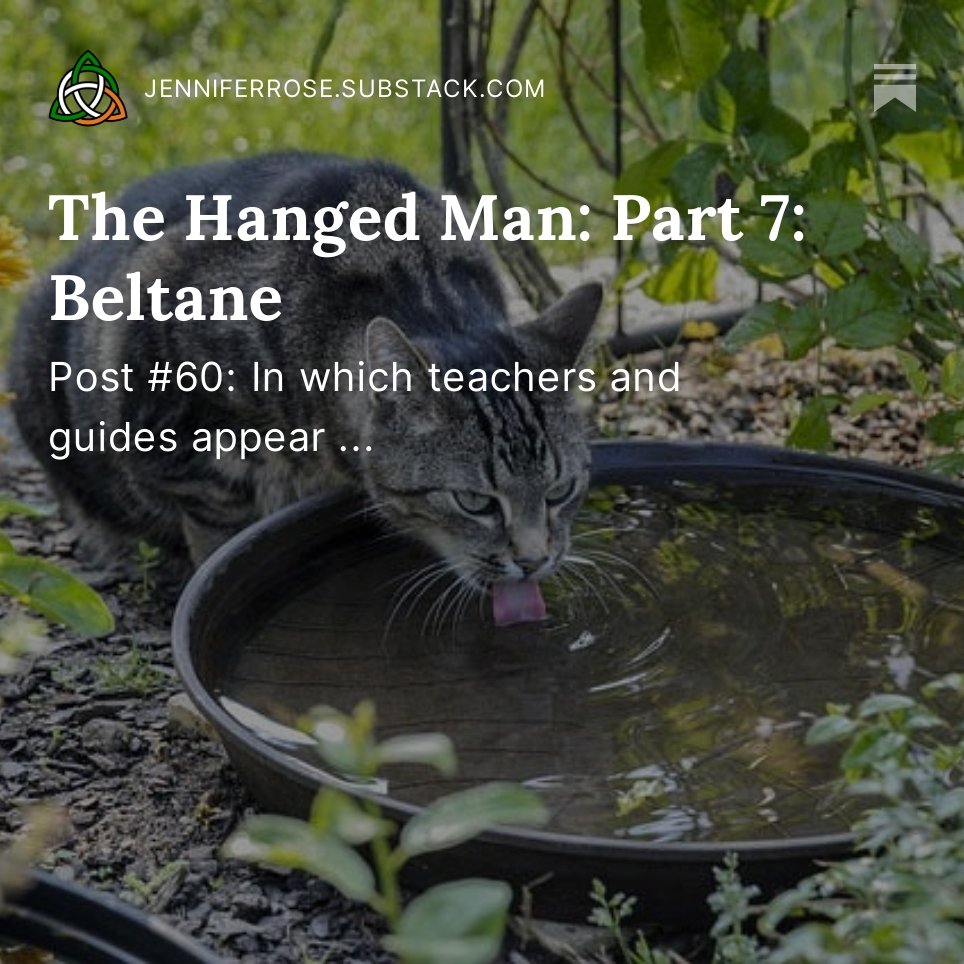
by Jenny Rose | Dec 17, 2022 | A Flourishing Woman, The Journey
I’m pausing. It wasn’t, I hasten to say, my idea! However, after an interesting and stressful concatenation of events I’ve decided to embrace the opportunity to pause.
It all started with a wonderful post from one of my favorite Substackers, Lani Diane Rich. It’s titled “Emotional Ex-Lax.” Honestly, how could anyone not go look at that post?

Photo by freddie marriage on Unsplash
The post suggests an exercise in blind journaling. I journal daily, first thing in the morning, with my first cup of tea. I don’t go on line first. I don’t work in the house, or start breakfast, or make my bed, or clean the cat boxes. I feed the cats (because if I don’t I won’t be allowed to sit peacefully and journal). I pee. I turn on one low light. I heat water and make tea. Sometimes I put on very low music. Sometimes I light a candle or two. At 5:00 in the morning there’s nothing going on. Darkness presses against the windows. Nobody needs anything from me. I’m free, and something of sleep’s twilight lingers. I sit with my laptop, open a new document, and start typing. Every month I delete the last month’s journal entries. I never look back at them. They’re for no one else’s eyes. It’s an entirely private space.
If, for some reason, I miss this time with myself, I notice it immediately. I’m not as centered. I feel more anxious. I feel more stressed. If I can’t get to a word processor, I journal with pen and paper, and then destroy it.
I never thought of blind journaling, though.
I recognized resistance. As I peeled the resistance away, I discovered the roots of it: perfectionism. That made me mad. I’ve worked so hard to uproot that toxic growth, but I never seem to get it all eradicated. It’s like bindweed, that bane of gardeners. Out in Colorado, where I used to live and garden, bindweed choked the dry landscape. Its roots can grow 6 feet deep. Any attempt to dig it up or kill it above ground merely encourages it. It grows fast. Herbicides don’t work. Its folk name is ‘Devil’s guts.’ A perfect description.
I think about perfectionism as bindweed.
Even as I journal, I edit. I correct spelling. I make sentences and paragraphs. Sometimes I even cut and paste. For a journal no one else will ever see and I won’t read again. For a journal document I’m going to delete in four weeks. If I blind journal I can’t edit as I write.
It won’t, God help me, be perfect. It won’t even kind of be perfect. I’m a good typist, but I make mistakes. Sometimes the cursor jumps around. Sometimes my sentence structure is poor.
Unacceptable.
So, naturally I made up my mind to try blind journaling, to challenge my perfectionism if for no other reason.
I chose a day off and journaled the usual way for a bit, then set a timer for 20 minutes, shut my eyes and blind journaled. I thought I was already emptied out, but wow. I was in full flood when the timer went off, and it felt like I’d only been doing it for five minutes. I loved it. I knew I was making mistakes (which I refused, by the way, to go back and fix!), but they didn’t interrupt my process. I just kept going, never looking back, never losing the thread of what I was saying. No visual distraction whatsoever.
I didn’t want to stop.
Well!, I thought. This will be a fun thing to blog about.

Izzy & Ozzy; Fall, 2020
I picked up my 16-ounce cup of tea, pomegranate green this season. Our little calico cat, Izzy, who had been snuggled in her favorite position in my armpit, woke up and decided she wanted to be in my lap where the laptop was. I pushed her away. She came back. I pushed her away. She started chewing on the upper corner of the screen, an obnoxious habit she has. I pushed her away with more irritation this time. The tea I was holding slopped onto the keyboard. I cursed, wiped it away, tipped the computer and let it drip out. I got a couple of Q-tips and dried around the three or four keys that got splashed. I sat down again to go back to my peaceful morning journaling.
The computer died.
Shit!
I plugged it in in case the battery was run down, but I knew it wasn’t. I let it be for an hour, then tried to turn it on.
Nothing.
When the computer store opened, I got in the car and took it over. Mark, my computer guy, shook his head. I left it in his capable hands.
Now my quiet day off, in which I didn’t have to go anywhere or do anything but noodle around at home, had turned upside down. My serenity fled. My excitement about starting a rough draft of a post on blind journaling withered. I couldn’t pay bills and deal with money, always a major stressor. Speaking of money, replacing my laptop would cost over $1,000. And what would repairs cost? And how much money do I have in savings? In checking? I couldn’t check! Panic until I remembered my cell phone is connected to the Internet. I couldn’t write, at least not with a word processor.
But none of that was the worst thing. The worst thing, and I’m completely mortified by this fact and would prefer to hide it from both myself and the world, was I couldn’t play solitaire!
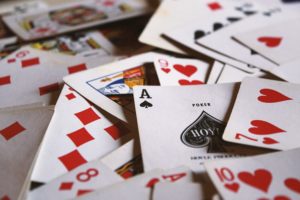
Photo by Jack Hamilton on Unsplash
This realization was so unwelcome I longed, craved, itched to play a few games of solitaire and “think about it.” Except that’s a lie. I wanted to play solitaire so I could numb out.
I roamed around the house, restless, wanting to crawl out of my own skin. The day I had looked forward to suddenly seemed dull and endless. I didn’t want to read. I didn’t know what to do with my anxiety. I started waiting for the phone to ring with news of my machine.
I did eventually get a grip but I recognized the symptoms of withdrawal from an addiction, and I didn’t like it. I kept myself busy with several tasks I’d been putting off. I cut greens I’d gathered with a friend a few days before and decorated for Yule. I pulled out a notebook and continued journaling, off and on, long hand. It gave me a sore hand, but it helped. I told myself I could rough out a blog post long hand, too. But it was probably not worth it. I’d have my laptop back by the end of the day. Probably. Maybe. Wouldn’t I?
I set aside the budget and a couple of bills I’d just received and weren’t due for a week or more. I tried not to think about money, or scarcity, or money.
Not thinking about money – la, la, la-la – fingers in my ears and eyes squinched shut.
I tried not to think about my email piling up. I read some of it on my phone, but the screen was so small it wasn’t much fun.
I thought and journaled about how busy I always feel, how often I hear myself say I’m tired, how overwhelmed I feel. I’ve been telling myself feeling overwhelmed is natural. I work; I run a blog and a Substack page, publishing on both every weekend; I’m writing another book; and now I’m co-manager of a long-distance situation in which a loved one is recovering from a broken hip and sinking into dementia. I anticipate making the long trip from Maine to Colorado and back again at some point during the holiday season, running the gauntlet of weather, travel complications, crowds, and various respiratory viruses. Oh, and spending money I don’t have. Especially if I have to replace my laptop.
Of course I’m overwhelmed.
Yes, said a snarky little voice in my head, “and how much time and energy does it cost you to play solitaire in all the pauses, cracks, and crevices of your life? What about visual stimulation? What about your problem with speeding? What about your anxiety? You’re not helping your anxiety, you’re feeding it!
The day passed and the computer guy didn’t call. The next day was a work day. Normally I would have been working on posts for the weekend ahead. I was beginning to feel behind. If I didn’t get the laptop back I wasn’t going to be able to post. Less than perfect. Inconsistent. Letting my readers down. Everyone would probably unsubscribe. Even if I got the laptop back, the weekend was going to be tight. Starting from scratch on Saturday morning for Harvesting Stones and on Sunday morning for Substack takes a lot of hours out of my weekend, when I also run errands, clean, do laundry, cook for the week ahead, and take care of business I haven’t had a chance to do during the week.
And I was already tired. Already wanting those two days off, not to fill up, but to relax in. Could the solitaire really be feeding my anxiety rather than calming it, I wondered?
Yes.
But –
Yes, your solitaire habit is feeding your anxiety. You know it.
Shit!
At the end of the day, I called my computer guy. He informed me my machine was disassembled and he’d been running a fan on it night and day. He didn’t know if it was a goner or not; he wasn’t going to put it back together and plug it in until he was sure every molecule of water was gone. He told me, rather pointedly, he’d call me.
OK, I thought. I won’t post this weekend. Nobody will care but me. I’m allowed to take a weekend off. I read all kinds of people who take frequent breaks and pauses. I don’t think any the less of them for it; in fact, I admire their self-care and confidence.

Photo by Alex Iby on Unsplash
Friday happens to be my nine-hour day at work, so I wouldn’t have used the laptop much that day in any case. I gritted my teeth, used a computer at work to catch up a little, and tried not to worry too much. I never play solitaire at work, so it was my third day without it.
Meanwhile, I made and received long distance calls from the facility where my loved one is recovering physically and wandering mentally. I finished the book I was reading and started another. I journaled a lot in my notebook. I played with the cats, giving them my full attention, which felt nice. I noticed what I was eating and enjoyed the taste of my meals, unusual for me. I savored my tea more. I wrapped a few Yule gifts and got them in the mail. I did some cleaning. I exercised. I put on an old movie and did upper and lower body resistance training in front of it rather than playing solitaire.
I slept well. I felt less exhausted. The inside of my head was quieter. I even took a nap, a thing I don’t normally do, as playing solitaire is “resting.” (Uh-huh. Whatever you say.) My anxiety ratcheted way down. I had a couple of crying jags, but they passed and I felt relieved rather than more upset when they were over.
I had more time.
I have more time because I’m not writing without my laptop, I thought.
“No. You have more time because you’re not playing solitaire in all the cracks and crevices,” said the snarky voice.
On Friday, while I was at work, my laptop was resurrected and my partner brought it home. What saved its life, I am told, was there was no sugar in the tea. Who knew?
By Friday evening, when I returned home from work, I’d made some decisions:
- No more solitaire.
- No more liquid in close proximity to the laptop.
- Take the weekend off. Really take it off. No pressure to post and publish. No solitaire. Embrace the pause. Make it last. Feel about things. Think about things. Be present.
All weekend I had the half delighted, half guilty feeling I was playing hooky. I ran several errands. I journaled on the word processor. I dealt with receipts, bills, accounts, the budget. I did some cleaning and laundry. I read. I listened to music. I watched a couple of movies and exercised. I played with the cats. I texted with a friend. I talked to my loved one and their nurse in Colorado. I made a new recipe for a pork shoulder in the crock pot which made the house smell like citrus, garlic, and herbs. I read several inspiring pieces from the Substackers and minimalists I follow. I started making notes for this post, which flowed into writing a rough draft.
It was a good weekend. It didn’t feel too short or too rushed. I didn’t feel pressure or anxiety. I slept well.
I’ve realized it’s time to make some changes. It’s a good time of year to reevaluate and do that, right? I didn’t set out to do it, but once it was forced upon me I realized I’ve been running a little faster every day for a long time, feeling a little more tense and anxious, and needing a little more numbing to manage it all. I’m grateful I was forced to stop. I’m going to start moving again, but in a different way, with slightly new priorities and without the damn solitaire!
(“You’ve finished the post!” says the snarky voice. “You’re way ahead this week. Wouldn’t you like to relax, play a game of solitaire, and celebrate?”
Oh, shut up!)
Questions:
What’s your favorite numbing activity?
On a scale of 1 (hardly any) to 10 (all), how much of your power does it have? Are you uncomfortable about the level of power your habit has over you?
Does your habit increase your anxiety?
Does your habit decrease your focus?
Have you ever formally kept track of the time you spend doing your favorite numbing activity?
Leave a comment below!
To read my fiction, serially published free every week, go here: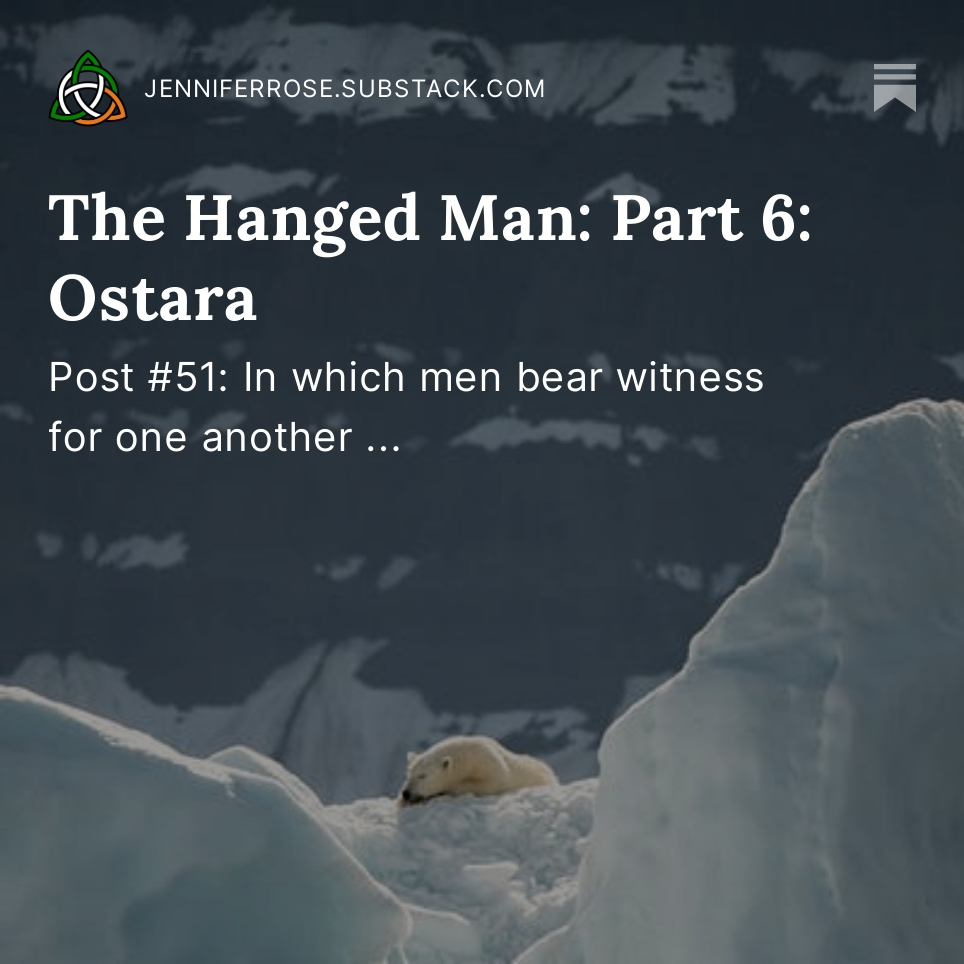
by Jenny Rose | Mar 19, 2022 | Choice, Power
I subscribe to a Substack newsletter for writers by Lani Diane Rich. A few weeks ago, she wrote about being bad. On purpose. It made me laugh.

Photo by 小胖 车 on Unsplash
I’m one of those people who has a recording angel at my shoulder, busily writing down every single less-than-perfect thing I think, say, or do. It’s a full-time job.
The idea of being bad – on purpose! – caught my attention.
Well, maybe not on purpose. Maybe just living in such a way that “bad” and “good” don’t enter into … anything.
But then again, maybe on purpose. Maybe writing badly, acting badly, cleaning a dish badly, or eating a whole pizza and letting the grease run down my chin without regret or guilt on purpose.
My horror at the idea (not about the pizza, though) makes me giggle.
This writer makes a great point. Doing things badly, in general, will result in negative feedback of one kind or another. But so does doing things well. In fact, sometimes doing things well results in more negative feedback than doing them badly! Then there’s always the average middle ground: doing things well enough to get by, thereby avoiding attention for being really good or really bad.
Ugh. I’d rather be bad than fit myself into average if I can’t manage good.
How many times in my life have I thought or said, “I’m doing the best I can”?
Hundreds. Thousands. Hundreds of thousands.
Why is it my job to do the best I can?
It used to be my job because I had to justify my existence. However, I’ve outgrown that mindset now and I can’t take it very seriously. I don’t have to justify my existence anymore.
I also did it to stay safe and get loved.

Photo by Laercio Cavalcanti on Unsplash
It didn’t work.
I do it to make a deal with the Universe. I’ll do this thing as best I can if you’ll make sure I’m OK.
Hard to say if that’s effective. I’ve always been OK, but I might have been without killing myself trying to be good.
I do it to prepare for failure. I’ll try as hard as I can, and if (when) I fail, at least I’ll know I gave it my best.
Failure and success. I’ve redefined those. I haven’t always gotten the success I’ve wanted, but that doesn’t mean I’ve failed. In fact, some of my most stunning missteps and miscalculations have turned out to be life-changing gifts.
In the end, I have one good reason for being good, and that has to do with my own integrity. It’s important to me to know I’m doing the best I can in everything I do. I don’t expect praise or rewards. I’ve learned (sadly) it’s no guarantee my needs will be met. I know better than to expect reciprocity or appreciation.
It’s simply who I choose to be in the world.
But here’s a question: are “bad” and “good” mutually exclusive? Would I be more flexible, more creative, healthier, happier, and more whole if I could be bad as well as good? Is there unexplored territory in badness? Could the ability to choose to be bad be part of being good?
Huh.
Could I choose to be some degree of bad along with good?
Being skilled, productive, effective, useful, kind, reliable, honest, etc., etc. all the time takes a lot of energy.
A lot of energy.
When we’re kids, we’re taught good things come to people who are good.
It would be nice if life was that easy.
I can’t help but notice while I’m doing my best from dawn to dusk some other people are not. Other people are sloppy and lazy and careless and they’re not struck down dead by a celestial lightning bolt.
A little voice in my head says that’s all the more reason I have to be continually good, to pick up the slack the fuck-it-I-don’t-care people leave.
Bullshit. I’m not the Cosmic Miss Fix-It.
Maybe it’s okay to think about taking a break from the job of being “so goddamn excellent all the time,” in Lani’s words.
Everyone needs a day off now and then. A lunch break. A vacation. Maybe I’ve worked too much overtime being excellent. Maybe I’ve lost my work-life balance.
Maybe.
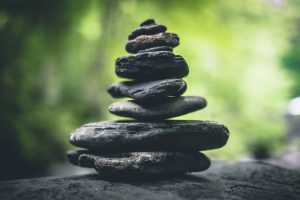
By Sean Stratton on Unsplash
by Jenny Rose | Dec 18, 2021 | A Flourishing Woman, The Journey
Last month, Seth Godin wrote about The Lifeguard Hack. Being a lifeguard, it made a lot of sense to me.
This week my team (of lifeguards) and I spent some time in the water training.

Photo by NeONBRAND on Unsplash
Just before Halloween, I pulled the trigger on finding another place to live, right around the same time I decided to serialize my fiction on Substack.
I wasn’t ready to do either of these things, and I’m not ready to have to go in the water and rescue someone at work, either.
Wait! Let me think about this some more. Let me prepare. Let me figure out how to do it perfectly.
Except life doesn’t wait.
Godin is so right. When someone is drowning, I’m going in. It doesn’t matter if I have the proper gear, equipment, attire, or level of energy and alertness. The temperature of the water doesn’t matter. I won’t wonder which form of entry to use. I won’t plan an approach. I probably won’t follow the exact script in our Emergency Action Plan. None of us will. I will blow my whistle, and if I don’t have my whistle, I’ll yell. Loudly. And I’ll go in.
I’ve moved house before. I’ve sold, bought, and figured out how to make it work. I’m not ready, because no one ever is ready, at least not if ready means knowing every detail beforehand. I wouldn’t have planned to decide to do this in late fall with winter and the holidays looming ahead. It just unfolded that way.

I’ve been thinking for years about ways to get my fiction into the world. Why Substack? Why now? Especially why now when I decide at the same time we need to move?
I don’t know. It’s time. It’s just time.
We re-certify every two years to keep our lifeguard status, and we train frequently. I have experience with moving. I have a disciplined writing practice and am an experienced blogger.
Performing a water rescue, buying a new home and moving into it, publishing on Substack, are all things I can do. I’ve done them, or something similar to them, before. There will be no perfect time. Rehearsing won’t help me. It’s just a way of allowing my anxiety and all the critics in my head to sabotage me.
While we’re hesitating, afraid of failure or less-than-perfect, opportunity slips away. While we’re waiting for the “right time,” we’re losing the time we have now. While we’re rehearsing how to pull a passive victim off the bottom of the deep end, they’re drowning.
For me, the key is not so much courage, which I have plenty of. It’s confidence I struggle with. But a lot of my struggle with confidence is based on old lies and distortions that are not real. I know I can perform a water rescue because I’ve done it before, many times in practice and a couple of times in real life. It wasn’t perfect. It didn’t look like the Red Cross training videos, where everyone is calm, the sun is shining, and it’s all by the book. But nobody drowned. Nobody died.
I hate moving. It opens up a lot of old trauma. But we need to move, and I know I can do it. I know liquor boxes make the best book boxes. I know how to show a house. I know how to navigate the legalities. I know where my power is, and I know what I can’t control in the process. It’s a familiar journey. Waiting for nicer weather, for the market to get better for sellers, better for buyers, or more stable in general; waiting for loans to be easier to obtain, or interest rates to go down, or to win the lottery; waiting for the stars to align just right because I’m scared, is not effective. The time is now. We’ll figure it out. Whether we have two years or a month of the process ahead of us, it’s begun and it will play out the way it plays out. It will be stressful, and exhausting, and a chaos of boxes (and cats) and belongings, tape and markers, and things we can’t find. It won’t be perfectly thought out or executed.
On Substack, people will read or they won’t. People will like the fiction, or they won’t. They’ll tell their friends and share it, they’ll comment, they’ll help me build a healthy, interactive community engaged in discussing community, story, and how to live more effectively on our planet, or they won’t. I didn’t start out perfectly. I go back every couple of days and tweak things. I’m figuring it out as I go.
We figure life out as we go. Our friends help us. We learn. We adjust. We make mistakes. We do our best.
So, yeah. If you go down in one of our pools while I’m on the stand, I’m coming in after you, and the rest of my team will be right behind me. I’m not ready. But I’m coming in.

Photo by Chris Kristiansen on Unsplash



















